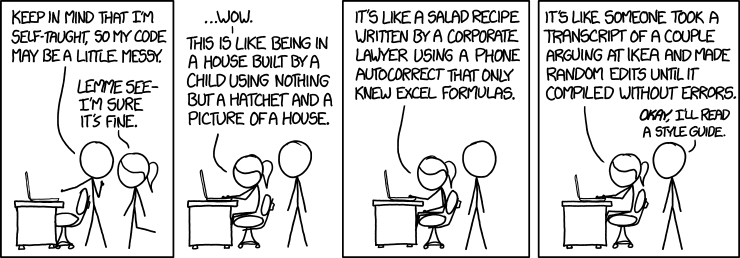Poorly written code is more costly in the long-run
- more time to understand
- more time to debug
- more time to fix
- more time to migrate
- more time to test
3/12/2019
Poorly written code is more costly in the long-run
“Indeed, the ratio of time spent reading versus writing is well over 10 to 1. We are constantly reading old code as part of the effort to write new code. …[Therefore,] making it easy to read makes it easier to write.”
– Robert C. Martin | Clean Code (p. 14)
So… be kind to your future self, and make your code easier to read.
Reading is a universal, trainable skill. Reading code is no exception.
There are 2 hard problems in computer science: cache invalidation, naming things, and off-by-1 errors.
— Leon Bambrick (@secretGeek) January 1, 2010
Consider making your names:
d = 90 # elapsed time in days
What is good and bad about the context of this line?
d won’t have that same context attachedelapsed_days = 90
What is so good about this version?
elapsed_days
get_them = function(the_list){
list1 = list()
for (x in the_list) {
if(x[0] == 4) {
list1 = append(list1, x)
}
}
return(list1)
}
What are the redeeming qualities of this function?
extract_flagged_orders = function(orders){
flagged_orders = list()
for (order in orders){
if (is_flagged_order(order)){
flagged_orders = append(flagged_orders, order)
}
}
return(flagged_orders)
}
is_flagged_order = function(order){
return(order[0] == 4)
}
What questions are left unanswered by the code above?
active_accounts = harvest_active_accounts() active_account_info = collect_active_account_info() active_account_data = retrieve_active_account_data() active_account_details = magically_generate_active_account_details()
ad_data = fetch_adgroup_information(ids = ad_ids) adgroup_performance = retrieve_ad_performance_data(x = ad_ids) account_detail = collect_adgroup_details(account_numbers)
Questions a reader might have:
fetch, collect, and retrieve?ad_data and adgroup_performance contain? Why is it different?adgroup_details = collect_adgroup_details(ids = adgroup_ids) adgroup_performance = collect_adgroup_performance(ids = adgroup_ids) account_details = collect_account_details(ids = account_ids)
collect, we are probably pulling in dataadgroup, account, id, detailsfor (ii in 1:length(ic)){
if (it[ii] > ith){
ti = ti + ic[ii]
}
}
Searchable names helps find code when you are
for (impression_index in 1:length(impression_totals)){
current_value = impressions[impression_index]
if (current_value > impression_threshold){
total_impressions = total_impressions + current_value
}
}
library(zeallot)
generate_and_send_guess_statistics_message = function(character, count){
if (count == 0) {
c(number, verb, modifier) %<-% c("no", "are", "s")
} else if (count == 1) {
c(number, verb, modifier) %<-% c("1", "is", "")
} else {
c(number, verb, modifier) %<-% c(toString(count), "are", "s")
}
guess_message = sprintf("There %s %s %s%s", verb, number, character, modifier)
print(guess_message)
}
create_and_print_guess_statistics_message = function(character, count){
message = select_guess_statistics_message(character, count)
print(message)
}
create_guess_statistics_messages = function(character, count){
if (count == 0) {
return(create_no_count_message(character))
}
if (count == 1) {
return(create_single_count_message(character)) }
}
return(create_many_count_message(character, count))
}
create_no_count_message = function(character){
create_statistics_message("are", "no", character, "s")
}
create_single_count_message = function(character) {
create_statistics_message("is", "1", character, "")
}
create_many_count_message = function(character, count) {
create_statistics_message("are", toString(count), character, "s")
}
create_statistics_message = function(verb, number, character, modifier){
sprintf("There %s %s %s%s", verb, number, character, modifier)
}
Description: Find a partner and exchange a block of code you have written. 50-100 lines. Try and refactor the code based on our discussion while maintaining functionality. For the first 10 minutes try not to ask any questions, and allow the code to “speak” for itself.
Time: 30 Minutes Total

Questions to keep in mind while you are refactoring?